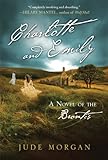 Jude Morgan’s Charlotte and Emily is mistitled. It is actually the story of Maria, Elizabeth, Charlotte, Branwell, Emily, and Anne Brontë, as well as their parents. In the UK, the book was titled The Taste of Sorrow, a title much more apt, though one could argue again that the Brontës endured much more than a taste of sorrow. I imagine the reason for the change stems from the notion that Americans will be more interested in Charlotte and Emily, as though we aren’t as likely to buy a book the book with Morgan’s title. I grow tired of this sort of retitling.
Jude Morgan’s Charlotte and Emily is mistitled. It is actually the story of Maria, Elizabeth, Charlotte, Branwell, Emily, and Anne Brontë, as well as their parents. In the UK, the book was titled The Taste of Sorrow, a title much more apt, though one could argue again that the Brontës endured much more than a taste of sorrow. I imagine the reason for the change stems from the notion that Americans will be more interested in Charlotte and Emily, as though we aren’t as likely to buy a book the book with Morgan’s title. I grow tired of this sort of retitling.
Morgan’s novel begins on the deathbed of Maria Branwell Brontë and traces the familiar family story from the coming of Aunt Branwell to help care for the children, to the loss of Maria and Elizabeth, casualties of the harsh conditions at the Clergy Daughters’ School in Cowan Bridge. Branwell is given the gift of toy soldiers, and he and his sisters create imaginative stories. As they grow, they find it difficult to leave behind their created worlds of Angria and Gondal. As adults, the sisters try their hand at teaching and governessing, but they are ultimately unhappy. Their brother Branwell succumbs to drinking and dissolution; meanwhile, they write.
Morgan’s writing style draws you in. He doesn’t attempt to mimic the style of the Brontës, and some expressions (Tabby’s “What’s up?”, for instance) seem jarring, but the overall effect is an admirable piece of work that brings the Brontë family alive. Patrick Brontë, the family patriarch, suffers a little under Morgan’s characterization, but as I don’t know much about the man, I can’t say that the characterization is unfair. Once again, I walk away from a book about the Brontës with the notion that no matter their unhappiness in life, I would really like to have sat at the table with all of them for tea and conversation. Branwell is the great unrealized genius, fiery and passionate. Anne, the dutiful, honest thinker. Emily, the blunt, private dreamer. Charlotte, much like her heroine Jane Eyre, a person whose passions run deep beneath the surface.
I highly recommend this novel to fans of the Brontës. It’s highly readable historical fiction that brings the reader into the world of the Brontës. Don’t take my word for it, however. The BrontëBlog has a glowing review of the book.
Rating:




This book concludes the All About the Brontës Challenge for me and is my fifth book in the Bibliophilic Books Challenge (one more will bring me to Litlover status). This book is also my sixth selection for the Typically British Reading Challenge, bringing me to the “Bob’s Your Uncle” level. I’ll keep going.




